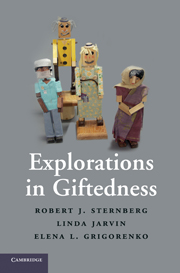Book contents
- Frontmatter
- Contents
- Preface
- 1 What Is Giftedness?
- 2 Theories of Giftedness
- 3 WICS as a Model of Giftedness
- 4 Intelligence and Giftedness
- 5 Creativity and Giftedness
- 6 Wisdom and Giftedness
- 7 Giftedness as Developing Expertise
- 8 Giftedness and Culture
- 9 Learning Disabilities, Giftedness, and Gifted/LD
- 10 Identifying the Gifted
- 11 Educating the Gifted
- References
- Index
4 - Intelligence and Giftedness
Published online by Cambridge University Press: 05 June 2012
- Frontmatter
- Contents
- Preface
- 1 What Is Giftedness?
- 2 Theories of Giftedness
- 3 WICS as a Model of Giftedness
- 4 Intelligence and Giftedness
- 5 Creativity and Giftedness
- 6 Wisdom and Giftedness
- 7 Giftedness as Developing Expertise
- 8 Giftedness and Culture
- 9 Learning Disabilities, Giftedness, and Gifted/LD
- 10 Identifying the Gifted
- 11 Educating the Gifted
- References
- Index
Summary
In the previous chapter, we briefly discussed intelligence as it is conceived of in the WICS model. In this chapter, we consider the nature of intelligence in more detail and review different models of intelligence proposed over the years. What is intelligence and what does it predict? This chapter discusses the nature of intelligence and how it relates to giftedness. Intelligence is important not only because it is relevant to identification of the gifted, but also because it predicts their school and life achievement (Barnett, Rindermann, Williams, & Ceci, in press; Deary & Batty, in press; Mayer, in press). It also helps predict whether one's intelligence will remain potential or be developed into useful expertise (Ackerman, in press). The chapter is divided into several major parts: The first discusses people's conceptions of intelligence, also referred to as implicit theories of intelligence; the second presents a brief discussion of intelligence testing; the third offers a review of major approaches to understanding intelligence; the fourth discusses how intelligence can be improved; and the last part briefly draws some conclusions. The chapter does not discuss artificial intelligence and computer simulation, neural networks, or parallel distributed processing. Much more detail can be found in Sternberg (2000b) and Sternberg and Kaufman (in press; see especially Davidson & Kemp, in press). A good source for the history of theories and research on intelligence is Mackintosh (in press).
- Type
- Chapter
- Information
- Explorations in Giftedness , pp. 54 - 81Publisher: Cambridge University PressPrint publication year: 2010



